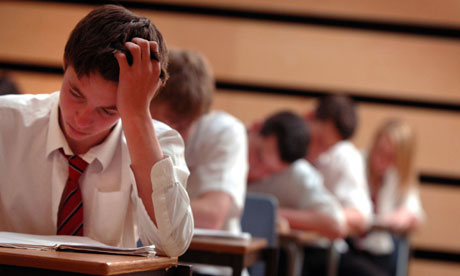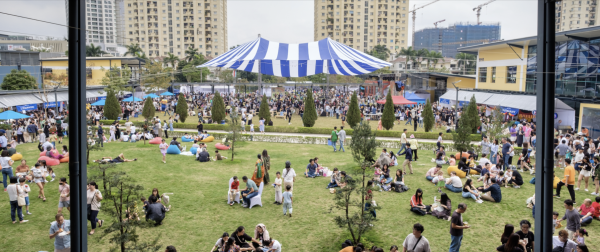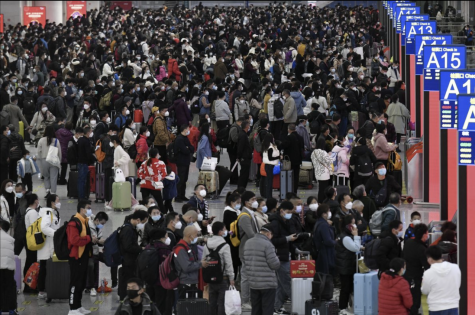After Mock Exam: Chat With the DP Coordinator

Photograph: Jim Wileman / Alamy/
Taken from The Guardian
It’s only weeks to the IB exam for grade 12 and some more weeks for the rest of high school until their final exam. The Flame has made a meeting with Mrs. Mills – the IB coordinator of Unis to get up to date with what grade 12 is doing as well as what they need to do in the future. This also applies to the rest of high school since we also have our final coming up in 2 months.
Reporter: How do you feel about this year’s students’ performance with Mock exam?
Mrs. Mills: I think it was a really good practice for them. Because it was really the one time they get the experience of being in an examination room with all of the students together. The ideal of the Mock is to get them a real practice, to make sure that they don’t talk for example, and follow the instructions which were given, etc… Most people did a pretty good job. They also learned quite a lot about they do and do not know about their subjects, so it’s very useful for them in term of what really they have to do. I think a lot of people put a lot effort in studying for Mock which is great.
Reporter: Does the result of Mock exam affect the final exam?
Mrs. Mills: No. There’s no relation between the marks of the mock and their actual final mark in IB exam. However, the mock exam does have an effect on their grades at school. Obviously that means it affects their GPA, and can also influence their final predicted grade for that that subject.
Reporter: How close is the mock exam to the actual IB exam?
Mrs. Mills: Very close in this school. We’re always within one grade boundary. Sometimes people are predicted a 6 get a 5, people are predicted to get a 5 get a 6. When we had some analysis done by the IB recently, they said that our predicted grades are very accurate.
Reporter: What should student do to prepare for Mock exam?
Mrs. Mills: One thing to remember about a Mock is that you really have to take them seriously and they get to treat them as the real practice, not just when you in the examination room, I mean as you prepare for the mock. The ideal is what you want to do is to try as much as you can. Because one, obviously you’ll do better in exam. Two, It gives you a much better idea of how you will actually do it in the final. So it’s very useful for students I think. What happens sometimes unfortunately though is people just go “just a practice exam, I won’t study”. They get poor results and then they get a bit panicking, they feel bad because they feel like they’re not going to pass the final.
In another way, if you study quite hard for the mocks, then for the final you will be just brushing up again you know it all but you’re just reviewing so that would be the best case I think. The best situation to be in would be to study hard for the mocks and then only have to the review for the final. But the hard thing about the mocks is that compare to the IB final the mock are very crammed in a very short period of time. Most people have to do 13 examinations approximately in one and a half week. So it is really a short time period whereas the actual IB final is stretched through 3 weeks. It’s quite hard to prepare to study in that time.
Reporter: What should the senior focus on to prepare for final exam?
Mrs. Mills: What they need to focus on is to allocate time well, especially for the weakest subject. Unfortunately, what people tend to do is stay away from their weaker subjects because they don’t like studying them. They need to look at their weakest result and spend more time on those subjects. The other important thing is to create a study schedule. Don’t just leave it to chance; actually physically create a study schedule that you can keep in several locations. What I was suggesting students is you have one on your bed room wall, you give one to your parents so they know what you’re meant to be doing in any given time. You have one with you stay your tablet, and you have a printed copy in your bag – multiple copies of the same thing.
In that study schedule you build in reward times, you might study for an hour and a half and then you have half an hour watching television for example and then study for another hour. Therefore, a really important thing to you is you need exercise and reward time and you need time to give your brain a rest. You can’t study all night. You can’t go home and say get home at 5 and then study until 1 a clock in the morning without any break. It’s not good for you and in fact, you won’t retain information that way. So if you want to be realistic and check the time that you use, you’ll actually study better. I guess you can call it “studying smarter rather than studying longer”.
I think a lot of people who tend to think the longer you study at a time; the better it’s going be. But in fact I don’t think it’s true. You need exercise, you need practice, and you need a lot of sleep, when you’re studying and when you’re doing exam. Having a thoughtful study schedule is the key to success. What you do is you work backward, from your last exam, and you slot in all of your study time for the subjects. You then try to evenly spread the study time; maybe spend more time on the weaker subject. Then you think about the rewards you’d like to give yourself, and make it a different reward every day. It’s psychologically a really good thing to have, just recognizing the fact that you can’t study all the time.
A big danger is when you go and don’t study anything. When the spring break begins, you don’t have any teacher with you saying “study now”. You have to allocate your time to the subjects; you have to do it wisely. So having a clear picture of what you are doing to do every day when you have to leave home, when you have to do the exam is central. Because unfortunately, what it means if you miss one examination, you miss your whole diploma. The IB is very strict about that unless you have really bad illness then that will be a different case. But if you just wake up late or come to the exam late then you’re in a big trouble.
Reporter: Thank You.



